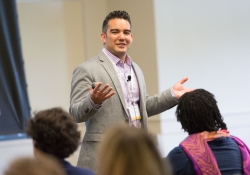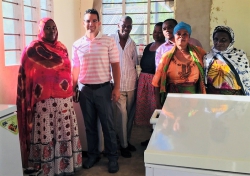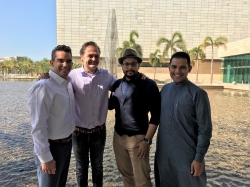Entrepreneurship Skills Shared Globally
PROVO, Utah – Mar 28, 2018 – The world truly is Chad Carlos’s campus as he travels to the Middle East, Europe, Africa, and Latin America to teach and conduct research.
Carlos has always been interested in international work and other cultures. With his background and knowledge in entrepreneurship, Carlos has shared key principles taught at BYU Marriott with people around the globe.
“My motive is largely to understand other cultures and how entrepreneurship works throughout the world,” Carlos says. “I try to look for opportunities to help people elevate their quality of lives by giving them skills that enable them to be better entrepreneurs.”
His international work has inspired the structure of a BYU Marriott entrepreneurship boot camp class where students come in on a Saturday morning for an eight-hour intensive day of training. Students learn about the process of coming up with an idea and then starting a business. They determine whether or not an idea is worth pursuing and learn all the factors that make a successful business.
The boot camp class is modeled closely after a week-long program Carlos conducts in different countries at universities focused on science and technology.
“You have people with great technical skills but no business skills,” Carlos says. “We put them through a rigorous course where we teach them the same concepts we’re teaching at BYU Marriott.”
In addition to working with students, Carlos has also been working with low-income entrepreneurs in Tasmania. For example, some entrepreneurs already have a basic business of raising chickens, so the technical training taught at BYU Marriott is more difficult to implement since they don’t believe they’re capable of doing anything else. They insist that raising chickens is all they can do since that’s all their family has ever done. In cases like this, Carlos focuses more on breaking social and psychological barriers so entrepreneurs are more receptive to the technical aspect.
Furthermore, Carlos uses his skills to conduct valuable international research. He’s the coauthor of Manu Militari: The Institutional Contingencies of Stakeholder Relationships on Entrepreneurial Performance, which contain fifty years of data on aviation startups in South America that help entrepreneurs in developing countries decide whether befriending politicians or military is more beneficial.
Carlos found that while entrepreneurs in Latin America often turn to politicians, they should be more alert that during times of political instability, strong ties to politicians can be a detriment.
“You have to be strategic and carefully think about these situations your company is facing and how relationships with different types of actors might be critical for your survival,” Carlos says.
With all the traveling, teaching, and researching Carlos does, one of his favorite parts is getting to know and work with students and forming relationships that will persist even after graduation.
“I’ve had several students who were in my class years ago reach out and update me on what’s going on with their business,” Carlos says. “It’s rewarding to see them progress and have success outside of class.”
Media Contact: Jordan Christiansen (801) 422-8938
Writer: Emily Colon






